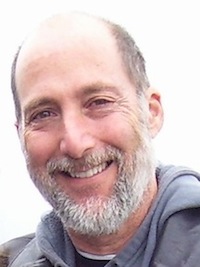Amy Stross: The Suburban Micro-Farm
September 19, 2019 by David
Filed under Non-Fiction, WritersCast
 The Suburban Micro-Farm: Modern Solutions for Busy People – Amy Stross – 9780997520835 – Twisted Creek Press – Paperback – 356 pages – $34.95 – March 23, 2018 – ebook versions available at reduced prices.
The Suburban Micro-Farm: Modern Solutions for Busy People – Amy Stross – 9780997520835 – Twisted Creek Press – Paperback – 356 pages – $34.95 – March 23, 2018 – ebook versions available at reduced prices.
“…this book takes a permaculture approach to starting a micro-farm in the suburbs that speaks not just to a stay-at-home mom or dad, but to all busy people. Indeed, it is one of the few gardening books that is aware that you may not have a lot of time to start a garden, and shows you that it’s still possible anyway.” – Jesse Frost, Hobby Farms
I love gardening, gardens, and would be thrilled if every suburban lawn was turned into a vegetable garden, berry patch or orchard (or all of those things). I’m an enthusiastic gardener, but not a great planner, and I need the kind of help that Amy Stross provides in this truly excellent book. Even if you never pick up a hoe or dig in the dirt, you will learn a huge amount about food growing in relatively small spaces from this book and you will be able to explain to your neighbors, friends and family why they all should be outside right now working on their gardens.
There is so much good information, and reading this book is so inspiring, it is impossible to know where to begin in describing it. Suffice to say, while there are many great books about gardening, but this one deserves to be on every gardener’s bookshelf, and especially for any beginner who wonders how to get started, this book is essential. There is alot of work involved when you seriously grow vegetables and fruit in a small space, and planning is essential. This book provides the gardener, beginner or otherwise, with terrific tools for planning and organizing, and for avoiding the many mistakes that are easy to make along the way to growing your own fruit and vegetables.
Now that it’s fall, this is the perfect time to start planning your garden for next year. Read this book, lay out and build your garden beds, and order seeds for spring! If you’ve never gardened before, start with a small space you can handle and build from there.
Here are just a few things covered in The Suburban Micro-Farm:
How to make your landscape as productive as it is beautiful
Why the suburbs are primed with food-growing potential
How to choose the best crops for success
Why you don’t need the perfect yard to have a micro-farm
How to use easy permaculture techniques for abundant harvests
The idea of an edible yard is more than just romantic, it is a practicality for many of us. There are lots of benefits besides being able to grow your own food – getting rid of lawns and lawn maintenance is good for the natural environment and makes a dent in climate change mitigation, raising vegetables and fruit is healthy for your body in two ways – the work of gardening is good for your health and the food you eat from the work you put in is always better than what you can buy in a store, even an organic one.
Amy is a terrific teacher, well organized, thoughtful and clear eyed.
I really enjoyed speaking with her and recommend this book to any and all who will listen. Visit her website here to learn more about Amy, her approach to gardening, and where to buy the book (though I recommend purchasing from my friends at Chelsea Green Press, who have been publishing books in this category for many years).
And have fun in the dirt! I was inspired by reading this book to build a bigger garden this year, which was very productive, and next year, we are planting blueberries and fruit trees in our very small front yard. Thank you Amy Stross!
Nonfiction Book Awards 2018 Gold Winner
Foreword INDIE Awards 2018 Gold Winner (Hobbies & Home category)
Nautilus Book Awards 2018 Silver Winner (Green Living & Sustainability category)


Podcast: Play in new window | Download
Joseph Kelly: Marooned: Jamestown, Shipwreck, and a New History of America’s Origin
March 18, 2019 by David
Filed under Non-Fiction, WritersCast
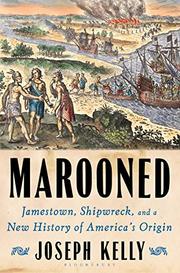 Marooned: Jamestown, Shipwreck, and a New History of America’s Origin – Jospeh Kelly – 978-1-63286-777-3 – Bloomsbury – Hardcover – 512 pages – $32 – October 30, 2018 – ebook versions available at lower prices
Marooned: Jamestown, Shipwreck, and a New History of America’s Origin – Jospeh Kelly – 978-1-63286-777-3 – Bloomsbury – Hardcover – 512 pages – $32 – October 30, 2018 – ebook versions available at lower prices
I really enjoy reading books about American history, and especially lately, books that explore some of the stories and moments that are foundational to the history of this continent, but are not well known or well told. And I’ve also become extremely concerned about gaining a better and more nuanced understanding of those stories that have been told solely from the perspective of the European (white) perspective that dominates our historical narrative, and thus our understanding of ourselves.
Joseph Kelly’s Marooned is just such a book, and I was immediately drawn to it. This is an insightful re-examination of the 1607 Jamestown settlement, the story of which really should replace the Mayflower colony’s position as America’s founding Puritan-centric myth.
In fact, the multiple stories of Europeans’ initial contact with the native peoples who fully inhabited North, Central and South America all require a complete re-examination, and I have been reading several books that provide insight into the way these continents were conquered by the marauding Europeans and their violence and diseases.
Marooned is about much more than just the Jamestown settlement. The book begins by recounting the settlement’s really awful circumstances. Most of those early settlers died of disease or starvation or deserted to the local tribes for protection. The workings of the Virginia Company that was set up to colonize and exploit the supposedly “virgin” New World are fascinating and in some ways depressingly familiar to our modern large scale version of unrestrained capitalism.
The traditional blame for the miseries of Jamestown’s early years goes to those leaders who failed to manage their “lazy” colonists, as opposed to those who were ready, willing and able to literally whip them into shape. But Kelly makes it clear that because it was the aristocrats who wrote the documents on which our traditional history relies, the real story may be, likely is, significantly different. Kelly finds ample evidence that the colonists who were cast into the wilderness, “marooned” from home and trying to survive, experienced a far different reality than their leaders. Many of them had a nascent understanding that Britain’s rigid class structure would not work in this different environment, and that their actual survival required a far more equitable system of governance. In fact, there were many uprisings and expressions of rebellion, all of which were put down, although a limited electoral oligarchy emerged during the course of the 17th century in the Virginia colony.
There are many side trips and journeys throughout this engaging narrative. The story of the castaways from one of the resupply ships on Bermuda, truly a story of being marooned, is striking. Nine ships en route to re-supply Jamestown in 1609 were hit hard by a hurricane, a storm of extreme high winds and waves, and one ship, the Sea Adventure, with some of the key leaders of the expedition on board, was wrecked on the shores of the Bermudas. The crew reached one of the islands in safety, and almost a year later, after building two boats by hand, they sailed again for Jamestown, and somewhat surprisingly, were able to reach their destination not long after departing from Bermuda. This story circulated widely in London, and may well have inspired Shakespeare’s great play, The Tempest. The timing is certainly right for that to be the case.
Kelly contributes a significantly better understanding of the Powhatan Confederacy’s formation and politics before and during the settlement period, as well as the fluidity between the cultures of the native peoples and the colonists. Marooned is not just the story of the Europeans and their conquest, but successfully weaves together the the narrative of the struggles of native peoples of that time and place in their powerful efforts to survive the arrival of the brutal land grabbing English settlers and the lives of the colonists at the lower ends of the social strata, whose stories we rarely, if ever, get to know.
It is a pleasure to discover such a good writer and story teller as Joe Kelly is. In this book, he truly brings history alive through its people, and with a narrative built on a solid grounding of research and a deeper understanding of the complexities of perspective than many other historians.
Joseph Kelly holds a Ph.D. in English from the University of Texas, Austin, and is a professor of literature and director of Irish and Irish American Studies at the College of Charleston. He is the author of America’s Longest Siege: Charleston, Slavery, and the Slow March Toward Civil War, and the editor of the Seagull Reader series. He lives in Charleston, South Carolina. Joe’s blog can be found here.

Podcast: Play in new window | Download
Justin A. Frank MD: Trump on the Couch: Inside the Mind of the President
October 23, 2018 by David
Filed under Non-Fiction, WritersCast
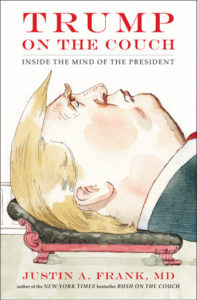 Trump on the Couch: Inside the Mind of the President – Justin A. Frank, MD – Avery – 304 pages – Hardcover – 9780735220324 – $26.00 – September 25, 2018 – ebook editions available at lower cost.
Trump on the Couch: Inside the Mind of the President – Justin A. Frank, MD – Avery – 304 pages – Hardcover – 9780735220324 – $26.00 – September 25, 2018 – ebook editions available at lower cost.
Inside the mind of this president is a scary place to be, as Dr. Justin Frank aptly tells us in this frightening and compelling book. In an interview with the Guardian newspaper, Dr. Frank said: “Yes, we should be scared,” Frank, a clinical professor of psychiatry at George Washington University, told the Guardian. “We have to accept that he is the president and we also have to accept that he’s never going to change because he can’t. Once we accept those things, we can then figure out what to do with our fears.”
Almost everyone I know has thought about the psychology of Donald Trump. So in some ways he might be the most analyzed person in the history of the world. Ironically, that appears to be exactly what he wants. Funny how whether one loves or despises Donald Trump, he wins, because his narcissistic, empty soul requires the full attention of the entire world and still cannot be satisfied.
In this book, like his two previous books on Obama and Bush, Dr. Frank has applied the principles of applied psychoanalysis, which allows him to at least somewhat clearly understand the mind of Donald Trump. While it is true that the American Psychiatric Association’s Goldwater Rule prevents psychiatrists from offering diagnoses on public figures who are not their own patients, Frank has invoked the moral responsibility that compels him to speak out, something which all of us can understand and appreciate. So much is at stake and so much is in the hands of someone who is demonstrably unstable, and as Dr Frank shows in this book, someone who is riddled with pathologies, and quite evidently, deeply disturbed.
From his close study of Trump’s patterns of thought, action, and communication, and an analysis of his personal life story, Dr. Frank uncovers a personality deeply distorted by mental health problems. His work reveals many insights about Trump and his behavior, including some highly disturbing glimpses into his childhood, his family, his business dealings, and Trump’s unique way of literally inventing his own reality.
While most of us can see for ourselves that our president is wildly unhinged, Dr. Frank’s more clinical description and analysis of Trump’s narcissism, misogyny, racism, and untruthfulness are highly useful in helping us to understand more fully the reasons and causes behind Trump’s pathologically disturbed behavior. Whether it can help us prevent him from leading us into disaster is unclear. But this book should be required reading for anyone, supporters and opponents alike. It might also help us to better understand his appeal to those who do find him compelling. At least for me, it made me want to turn off the television and stop giving him the attention he craves. I wish the news media would do the same.
I very much enjoyed the opportunity to talk about this book with Dr. Frank, and to learn so much from a professional analyst.
Read more about the book at the author’s website.
“I’ve known Trump a long time and I have even tried my own hand at psychoanalyzing him on television. But, Dr. Frank has shown a more complete picture inside our 45th President’s mind than I ever dared to consider. Behind all Trump’s tough guy theatrics, his petty cruelties and bloated ego is a tangled knot of pathologies that should terrify us all. Trump on the Couch is a great first step to sizing up the President’s inner demons.”
—Donny Deutsch, Co-Host on MSNBC’s Morning Joe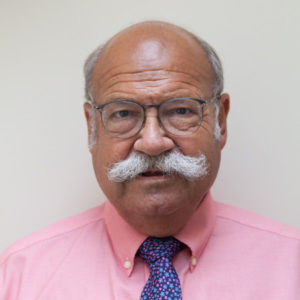
Podcast: Play in new window | Download
Tom Shroder: The Most Famous Writer Who Ever Lived
January 20, 2017 by David
Filed under Non-Fiction, WritersCast
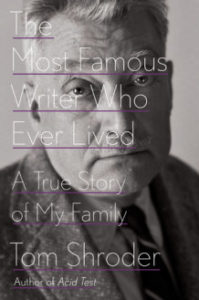 The Most Famous Writer Who Ever Lived: A True Story of My Family – Tom Shroder – Blue Rider Press – hardcover – 9780399174599 – 416 pages – $28 – published October 4, 2016 (ebook editions available at lower prices)
The Most Famous Writer Who Ever Lived: A True Story of My Family – Tom Shroder – Blue Rider Press – hardcover – 9780399174599 – 416 pages – $28 – published October 4, 2016 (ebook editions available at lower prices)
Tom Shroder is an excellent writer and an experienced editor who has had a long career as a journalist, as well as having also written some really interesting books. As it turns out, he is the grandson of the once-bestselling author, MacKinlay Kantor, who won the Pulitzer Prize in 1956 for his sprawling historical novel about the Civil War, Andersonville. I expect that a number of my listeners will have read that book, and many will quite possibly remember MacKinlay Kantor as someone who was an extremely well known and popular author in the fifties and sixties.
Like so many of us, Shroder grew up mostly taking his grandfather for granted, and while he was close with both his grandfather and grandmother, Tom did not really know very much about their actual lives before he was born, when their lives were very different. Their daughter, his mother, was also a writer as Tom was growing up, but he did not want to identify with the literary milieu of his youth. It was only later in his life that he was spurred to learn more about his family history, and to begin to understand himself within any kind of a personal literary context.
This book recounts the thoroughly compelling MacKinlay Kantor’s very colorful and intentional life as a writer, as well as weaving together Shroder’s own story, which is one of becoming a writer without perhaps intending to do so. It works amazingly well, and even if you have never read Andersonville or any of the other many books Kantor wrote during his long and checkered career, this particular book is likely to captivate you. It is full of wonderful stories and empathetic emotional connections.
Shroder’s journey to understanding who his grandfather was turns out to be almost as epic as Kantor’s actual life, full of twists and turns, discoveries and surprises. I read Andersonville long ago, and remember being fully engaged by its epic scope and historical detail. But I had forgotten that Kantor was also the ghost writer for Curtis Lemay later in his life, when things were not going so well for him. His was a complicated and very American 20th century story, story, and Shroder tells it exceptionally well.
Tom Shroder has been an award-winning journalist, writer and editor for nearly 40 years. His books include Acid Test: LSD, Ecstasy and the Power to Heal (2014), a mind-altering account of the resurgent research into the medical use of psychedelic drugs; Fire on the Horizon: the Untold Story of the Gulf Oil Disaster (2011) (co-author); and Old Souls: Compelling Evidence From Children Who Remember Past Lives (1999), a study of the border between science and mysticism.
He was the editor of The Washington Post Magazine between 2001 and 2009, where he oversaw Gene Weingarten’s two Pulitzer Prize-winning feature stories, “Fiddler in the Subway” and “Fatal Distraction.”
Shroder’s The Hunt for Bin Laden (2011) was based on 15 years of reporting by The Washington Post. Shroder is also known for co-creating the Tropic Hunt, a mass-participation puzzle which has become The Washington Post Hunt in Washington, D.C.
Shroder was born in New York City in 1954.
You can visit Shroder’s author website here.
“Fascinating…As Shroder vividly tells the story of this larger-than-life writer who was a generous and often doting grandfather, he contemplates the fleeting nature of fame….a biographical gold mine and an object lesson in the ultimate fading away of the best-selling, prize-winning success many writers dream about.”
—Susan Cheever, The Washington Post
This book was a pleasure to read, and the conversation with Tom Shroder was a lot of fun for me as well. He made this interview extremely easy for me to conduct.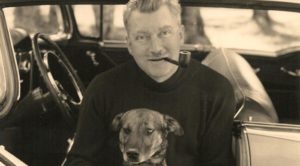
Podcast: Play in new window | Download
Jesse Kornbluth: Married Sex
November 18, 2015 by David
Filed under Fiction, WritersCast
 978-1504011259 – Open Road Media – paperback – 246 pages – $12.99 (ebook versions available at lower cost)
978-1504011259 – Open Road Media – paperback – 246 pages – $12.99 (ebook versions available at lower cost)
I’ve been a subscriber to Jesse Kornbluth’s excellent newsletter, HeadButler, for awhile now, and have very much enjoyed his approach to books, music and art (politics and culture too). In many ways, he represents to me the quintessential New York intellectual: smart, well read, opinionated and caring about the future of humanity and our civilization. He’s a writer of screenplays and a number of interesting and successful nonfiction books, and he has long been involved in the emerging forms and formats of online digitally-based culture, going back to his days as editorial director at AOL.
Married Sex is his first novel. It is short, extremely well written, and completely compelling. Jesse has brilliantly portrayed his characters, both male and female, and pinpoints them for the reader in very few words. It’s also a fun book to read. Sex with intelligence, you might say.
Without giving away very much of the story, let’s just say that the focus is on a couple who have been together a long time in a committed, deeply sexual romantic relationship. Then something happens that changes everything. You have to read the book to find out more. I think you will enjoy this book a lot. I love this line about it from Kirkus: “A libidinous fairy tale with an unusual Prince Charming.”
And I also think you will enjoy listening to my conversation with Jesse as well. He’s funny and trenchant, and we had a great time talking to one another about the book, his work, and how this book fits into his life. And oh yes, let’s get this settled right away – it’s a novel, not a memoir.
I often recommend Jesse’s newsletter and website to friends, HeadButler.com, what he calls “a cultural concierge site.” I’ve discovered and sometimes rediscovered a number of books and records through his literate and intelligent recommendations. It’s all free, based on the perhaps dubious concept of readers buying things he recommends from Amazon.
Jesse Kornbuth was the Editorial Director at AOL, was a contributing editor to Vanity Fair and New York magazines and is the author of four nonfiction books, including Highly Confident: The Crime and Punishment of Michael Milken. He has written several screenplays for ABC, PBS, and Warner Bros.
Married Sex is Kornbluth’s first novel. He lives in Manhattan with his family. I am looking forward to reading his next book.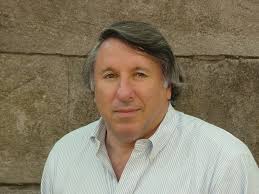
Podcast: Play in new window | Download
Martin Goldsmith: Alex’s Wake
July 6, 2015 by David
Filed under Non-Fiction, WritersCast
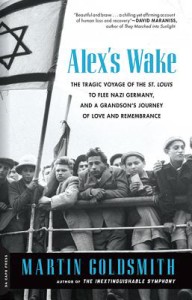 978-0-306823-71-8 – DaCapo Press – paperback – 352 pages – $15.99 (ebook editions available at lower prices)
978-0-306823-71-8 – DaCapo Press – paperback – 352 pages – $15.99 (ebook editions available at lower prices)
I seem to have an inordinate interest in books about the Holocaust, doubtless because I think about my unknown relatives who perished in Lithuania and Poland during WW II, and feel somehow that knowing what happened to other Jews in that awful time will help me imagine the story of what happened to my own relatives. It’s difficult not to wish that there were more accounts of heroic escapes from the Nazis and their allies in every country they occupied, but more often than not, the stories we do get to know are deeply sad, frustrating, or horrific.
Martin Goldsmith’s parents came to the United States in 1939 from Germany, having survived the Nazi regime only because they were classical musicians who played in the Kulturbund, a special group of Jewish musicians that entertained other Jews in Germany (that was the subject of Martin Goldsmith’s last book, THE INEXTINGUISHABLE SYMPHONY: A True Story of Music and Love in Nazi Germany).
This new book, Alex’s Wake, is principally the story of Goldsmith’s grandfather and uncle, who tried to escape Germany in 1939 on the ill-fated journey of the German luxury liner, the SS St. Louis, which took more than 900 Jewish refugees (at their own expense, paying high prices to the German steamship company) across the Atlantic, first to Havana and then, having been turned away by the Cubans, to the USA and Canada, which also refused the refugees entry to their countries. This meant that the ship had to sail back to Europe, where amazingly and after great effort, the refugees were accepted by England, Holland and France. Only those who went to England truly escaped, however, as soon after the Germans overran both France and Holland, and these forlorn, long suffering escapees were once again under the thrall of the Nazis, who now could kill European Jews without restraint.
Goldsmith’s father suffered lifelong guilt for not being able to rescue his father and brother (and one must imagine, also his mother and sister, whose stories are really not told here, but who also were murdered in the war). That guilt was ineffably passed on to the grandson, and this book is Martin’s attempt to expiate that guilt, and to understand as much as it is possible, the story of his family’s travails more than 70 years ago.
Goldsmith and his wife traveled to Europe, spending six weeks retracing the journey of his antecedents, Alex and Helmut Goldschmidt. That journey forms the structure of the book, around which is built the narrative of his family’s formerly happy and successful life in Germany, their struggles to escape the Nazis, the terrible journey of the SS St. Louis , and especially moving, the detailed tracking of Alex and Helmut’s terrible time in occupied France where their hopes were truly lost, and where, after great suffering, they were transported to Auschwitz and finally their deaths. Along the way, Goldsmith learns a great deal about his family’s life in Germany, meets many interesting people, and in fact helps to change the lives of others as well as his own.
This is a fine example of narrative nonfiction and while at times painful, well worth reading. Goldsmith’s improbable effort to expiate his family’s guilt and suffering brought forth forgiveness and a sort of transcendence both for himself and others involved in the story, and the book’s honesty and beauty in the face of pain enables us to overcome the sorrow that inevitably arises when experiencing a story of deeply felt pain and loss. He’s an engaging writer and memoirist, and a fine storyteller.
Martin Goldsmith has been a radio host for public radio and Sirius XM, where he now is director of classical music programming and appears on the Symphony Hall channel. Goldsmith has also sung with the Baltimore Opera Company and the Washington Opera. He has also acted in Washington-area theaters, including Arena Stage. His music reviews have appeared in the Washington Post and he is the author now of three books, including Alex’s Wake.
Website for the book is here. Alert – we had a really good conversation so this interview runs slightly long at almost 42 minutes.
Podcast: Play in new window | Download
Tom Bouman: Dry Bones in the Valley
November 24, 2014 by David
Filed under Fiction, WritersCast
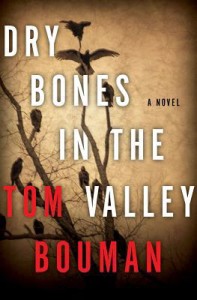 Dry Bones in the Valley – 978-0393243024 – Hardcover – W.W. Norton -$24.95 (ebook version available at lower prices)
Dry Bones in the Valley – 978-0393243024 – Hardcover – W.W. Norton -$24.95 (ebook version available at lower prices)
This is a very fine mystery set in an unusual locale – rural Pennsylvania (fracking country). I don’t usually read mysteries, but one of the pleasures of doing interviews with writers has been that I have been sent books by publishers that I would normally never have even looked at on my own. It’s fun to pick up a book, to start reading a few pages and then to be thoroughly hooked. That happened for me with Tom Bouman’s fine first novel. I really liked the portrayal of his main character, the local policeman, Henry Farrell. He’s terrifically drawn and is a compelling, complicated, extremely human character. And I liked the way Bouman worked his way slowly into the depths of the story. And I really loved the way he wrote about the people who live in this isolated rural county in Pennsylvania.
Bouman’s interest in the outlaws and eccentrics who inhabit this world, his appreciation and even love for those who have kept to themselves, and to older forms of relationships among family and neighbors is palpable and powerful.
The book revolves around a body found in the woods and the search, naturally enough, for the killer. This novel is well worth spending some time as the story unravels. Great characters and fine writing make for a terrific read.
Author website here. Bowman used to work in publishing – he was an editor – and now lives in northeastern Pennsylvania with his family. As of this writing, he is attending law school, so it may be a little while yet before he publishes his next book. And here is a terrific piece that Bouman wrote for Modern Farmer about rural crime fiction (that is a genre I did not know even existed!) I am hoping we’ll see a new book from Tom Bouman before too much time passes.
Podcast: Play in new window | Download
Douglas Rushkoff: Present Shock: When Everything Happens Now
September 21, 2013 by David
Filed under Non-Fiction, WritersCast
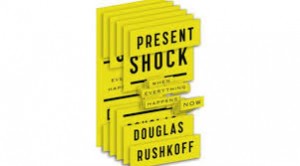 978-1591844761 – Current – Hardcover – $26.95 (ebook versions available at lower prices, and paperback edition due February 2014)
978-1591844761 – Current – Hardcover – $26.95 (ebook versions available at lower prices, and paperback edition due February 2014)
“If the end of the twentieth century can be characterized by futurism, the twenty-first can be defined by presentism.”
As it happens, I started this Writerscast project as an antidote to my own sense of what Douglas Rushkoff calls Present Shock, which is about how time, technology, attention, human intelligence, culture, meaning, advertising, commerce and belief systems that mark 21st century modern life have changed the way we experience our lives. This is an important book that having read and thought about, I can highly recommend.
What is ironic is that all of the things about our time that Rushkoff talks about in Present Shock, our feeling of being too busy and overwhelmed with input, our inability to filter out what does not matter to us and to focus on what does matter most are all the reasons why so many people I know will end up not reading this book at all. In fact the author felt those same issues during the writing of the book, and had to devise a plan and method that allowed him to concentrate on getting the work done.
You are not alone if you are feeling the need to make some space for yourself. It took me much longer to read this book than it would have some years ago. And it took me much longer to find the space in my life to write this short piece and post it than I am comfortable with. Technology in communication has enabled tremendous gains for many of us, while at the same time enslaving us to our devices.
Rushkoff brilliantly describes what has happened to us – the end of narrative, changes in the way we perceive and operate in time, what he calls digiphrenia – mental chaos provoked by digital experience – our need to escape the present, and our inability to filter information and sensory input. We instinctively know what he is talking about because we experience it ourselves every day.
But most of the time, most of us believe all of these concerns are personal and individual – how do I learn how to cope with the modern world? I think Rushkoff’s point in this book is that these are not individual problems, they are structural, and we need to start thinking about ways we can alter the course of our culture, to take control of technology, to act rather than be acted upon. In that way, this is an inspiring book, which I hope will lead to change in thinking and behavior.
I interviewed Doug about one of his earlier books, Program or Be Programmed. He is a terrific talker as well as writer and I am sure you will enjoy listening to our conversation. 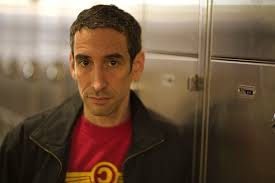
Podcast: Play in new window | Download
Dean Bakopoulos: My American Unhappiness
September 5, 2011 by David
Filed under Fiction, WritersCast
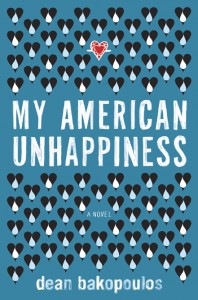 978-0151013449 – Houghton Mifflin Harcourt – Hardcover – $24.00 – ebook editions available
978-0151013449 – Houghton Mifflin Harcourt – Hardcover – $24.00 – ebook editions available
Dean Bakopoulos is a very funny and perceptive writer. My American Unhappiness, his second novel, takes place in Madison, Wisconsin during the period of the second Bush administration. Both the geographical and political backdrops are crucial elements of the story, whose main character is Zeke Pappas, a nebbish who runs a nonprofit called the Great Midwestern Humanities Initiative.
Zeke is an obsessive of some great measure. His life work has become the creation and maintenance of an “inventory of American Unhappiness,” a project that is a “byproduct of an overly cerebral loneliness.” He is also wildly naive and unrealistic, characteristics which in a certain way serve him well, as he is surrounded with problems in his life that would defeat the average person in short order.
Bakopoulos brilliantly balances the personal difficulties faced by Zeke with his involvement with some of the darker elements of the Bush era, including corrupt conservative politicians hiding the kind of personal behavior they legislate against in public, and the disconcerting pursuit of Zeke by a dark security-oriented governmental agency established after 9/11.
In some ways, the book could be read as just a zany midwestern comedy, but it’s clear that with Zeke Pappas’s story, Bakopoulos wants to tell us something important about 21st century American society. Zeke’s world is falling apart. His mother develops cancer, and decides to give her orphaned grandchildren (whom Zeke loves) to an aunt, unless Zeke can marry in time (impossible for him as he is simply too unrealistic about women). The government wants to audit the nonprofit he runs. Nothing works for Zeke. It’s a situation he feels he shares with the country as a whole, and Zeke knows it is the President that is the source of American unhappiness and ennui. Zeke sees Bush as “unencumbered by something as pervasive as unhappiness,” which makes him unfit to lead a country as complex and haunted as America. For Zeke Bush does not have the depth of spirit required to lead the nation.
Dean Bakopoulos is a writer to watch, a writer with great skills and who does have the depth of spirit required to portray the American scene through fiction. He is also a terrific writer to talk to about his work and gave me a great interview. You can visit his website to learn more about his work and ideas.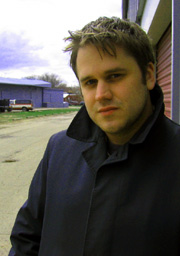 I am definitely looking forward to reading his next book.
I am definitely looking forward to reading his next book.
Podcast: Play in new window | Download
Paul De Angelis: Dear Mrs. Kennedy, The World Shares Its Grief, Letters November 1963
September 23, 2010 by David
Filed under Non-Fiction, WritersCast
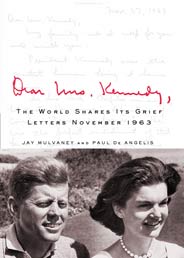 978-0312386153 – St. Martin’s Press – Hardcover – $19.99 (also available as an e-book at $9.99)
978-0312386153 – St. Martin’s Press – Hardcover – $19.99 (also available as an e-book at $9.99)
Are there more books about the Kennedys than about the Lincolns? I don’t know, but I am certain that there are many of them and my guess is that many who lived through the Kennedy era and many who did not, may feel they know everything they need to know about the Kennedys, JFK and Jackie, and the rest of the family. Reading this book may well change their minds.
In fact it’s a wonderful window into the heart and soul of America and in fact the world in the period just after the assassination of JFK in Dallas in November, 1963. Now almost a half century beyond that time, these letters, written by the famous and the ordinary, old and young, depict a period of extreme pain, emotional and social disruption, grief, sorrow, and disbelief that affected an incredible number of people all over the world. It gives us an opportunity to understand a great deal about how human beings respond to a devastating public tragedy. And some of the letters are simply beautiful, and transcendent in their expression of sympathy and emotion.
The story of the letters themselves is amazing – over 1 million condolence letters, notes and cards were sent to Jacqueline Kennedy in the months after the death of JFK. They were filed away and saved for many years, and despite a controversial culling in the 1980’s, there are still almost 400,000 letters, now cataloged and available for historians and journalists and the public to read and review. Editors Jay Mulvaney (who sadly passed away while working on this book) and subsequently Paul De Angelis, have given us a wonderful narrative and selection of letters that uses the words of the original writers to bring this terrible period in our history to life in an unusual and compelling tapestry of voices.
Paul De Angelis is a freelance editor and writer who lives in rural Connecticut. He’s been an editor, editorial director and editor-in-chief for a number of publishers. In our conversation about Dear Mrs. Kennedy, he talks about the process of putting this book together and highlights a number of the most interesting stories and letters in the book. For readers who lived through the 1960’s, this book will bring back many difficult emotions, and for readers for whom this is only history, these letters can bring the events of that period to life in a very powerful and compelling way, as the writers of these letters always speak from their hearts. You can see more from the book at Paul’s own website.
Full disclosure: the co-editor of this book, Paul De Angelis is a friend and occasional colleague, which does not make this book any less worth reading, of course.
Podcast: Play in new window | Download

